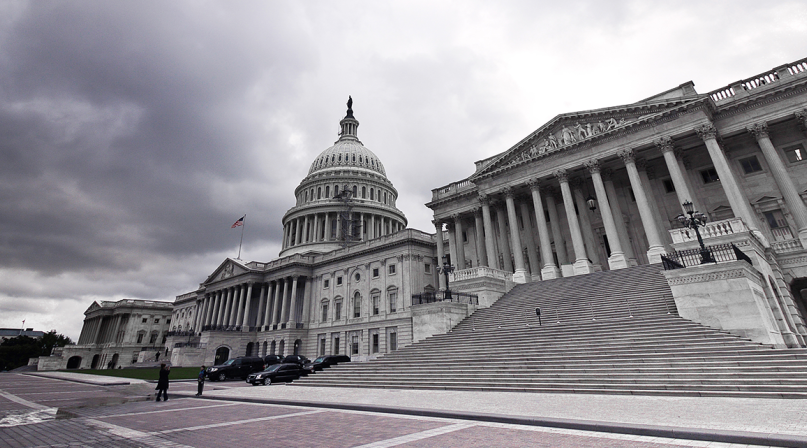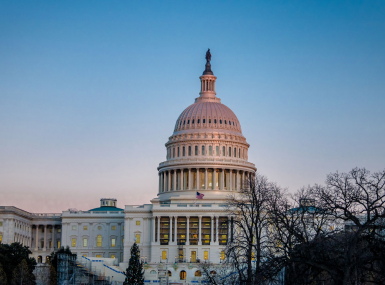County priorities in the lame duck session: Key advocacy efforts for local leaders
Upcoming Events
Related News

Key Takeaways
Now that the 2024 elections are over and as the congressional lame-duck session progresses, lawmakers are working to address critical priorities before the year ends. NACo is actively collaborating with Congress and the administration to advance key county issues, including disaster relief, infrastructure funding and critical reauthorizations. County leaders play a vital role in shaping these outcomes, and the information below is designed to support their advocacy efforts to ensure federal policies align with local needs.
In addition to the lame duck legislative priorities outlined below, another key item counties should be aware of is the quickly approaching December 31, 2024, obligation deadline for counties to invest their American Rescue Plan Act (ARPA) State and Local Fiscal Recovery Funds (SLFRF). Counties nationwide are assessing how best to allocate these critical resources. Passed in 2021, the ARPA SLFRF provided $65.1 billion in direct, flexible aid to counties, parishes and boroughs across the United States, offering a unique opportunity to respond to immediate pandemic-related needs, support long-term recovery, and strengthen community resilience.
The obligation deadline means counties must not only allocate these funds but also have contractual commitments in place before the year ends. If your county does not allocate funds by the December 31, 2024 deadline, you will be required to send back funds to the U.S. Department of Treasury. NACo, the National League of Cities (NLC) and the Treasury Department hosted a webinar to help counties meet their obligation goals and stay in compliance with federal requirements. For more about the obligation deadline, view NACo’s obligations FAQ webpage here and top 5 obligation insights here.
The current Continuing Resolution (CR) that Congress passed to extend appropriations beyond September 30 is set to expire at midnight on December 20, 2024. With no bipartisan agreement on final Fiscal Year (FY) 2025 appropriations, Congress will look to pass another CR into the New Year. Counties rely on federal funds determined through the annual appropriations process to provide vital services to our residents. We urge Congress and the President to finalize FY 2025 appropriations as soon as possible and commit to working together to reach an agreement on all spending legislation by Oct. 1 of each year.
Learn more Advocacy Template Letter for your County
On November 18, the White House submitted a $98.6 billion disaster relief funding request to Congress to address recent disasters such as Hurricanes Helene and Milton, the Maui wildfires, and Midwest tornadoes. This funding is critical to helping counties recover from unprecedented devastation and sustain essential services for their communities. However, the request has only initiated the Congressional appropriation process, and the final funding amounts remain uncertain. Counties urge Congress to prioritize robust disaster funding in the supplemental package.
NACo's Disaster Intergovernmental Task Force highlights the essential role counties play in disaster response and recovery, advocating for federal resources to rebuild resilient communities. Counties are encouraged to contact their members of Congress, emphasizing the importance of passing disaster relief funding swiftly to meet immediate recovery needs and address the unmet impacts of prior disasters.
Learn more Advocacy Template Letter for your County
The Secure Rural Schools (SRS) program is a lifeline for rural counties and schools affected by declining timber harvests on federal lands. It provides essential funding for critical services, including infrastructure maintenance, search and rescue operations, disaster preparedness, and education. Without Congressional action, SRS payments will end in 2025, leaving forest counties facing significant budget shortfalls that could severely impact local services.
On November 12, the Senate took a key step by unanimously passing the Secure Rural Schools Reauthorization Act of 2023 (S. 2581). Now, counties must urge their U.S. House Representatives to prioritize swift passage of SRS reauthorization to ensure continued support for timber communities. Congressional reauthorization is essential to prevent service disruptions and maintain stability in these counties.
Learn more Advocacy Template Letter for your County
Repealing the Windfall Elimination Provision (WEP) is critical for counties because it affects the retirement benefits of county employees who have worked both in the private sector and in public service. The WEP reduces Social Security benefits for those who also receive a government pension, including county employees. This unfair reduction affects approximately 2.1 million state and local government workers, reducing their benefits and creating a financial hardship for those who have dedicated their careers to public service.
On November 12, the House of Representatives passed the Social Security Fairness Act of 2023 (H.R. 82), which aims to eliminate the WEP and restore full Social Security benefits to public employees. This is a significant step toward making benefits fairer for individuals who have worked in both the private and public sectors. Repealing the WEP would ensure that county employees, who are often overlooked in the current system, have access to their full Social Security benefits upon retirement.
Counties should urge their Senators to support and pass H.R. 82 to eliminate the WEP and provide a fairer system for all workers, regardless of their career path. Repealing the WEP is an important step toward ensuring that those who have served in both the private and public sectors are treated equitably in their retirement.
Learn more Advocacy Template Letter for your County
Operating in 29 states, County Veteran Service Officers (CVSOs) play a vital role in helping veterans secure over $50 billion annually in federal health, disability, pension, and compensation benefits. While CVSOs focus on guiding veterans through the federal benefits system, these offices are primarily funded by counties, creating significant resource challenges, especially in areas with high demand or rural populations. The lack of federal funding disproportionately impacts counties’ ability to meet veterans’ needs.
On November 18, the U.S. House passed the bipartisan Senator Elizabeth Dole 21st Century Veterans Healthcare and Benefits Improvement Act (H.R. 8371), known as the Dole Act, by an overwhelming 389-9 vote. This legislation includes a scaled-back version of the NACo-endorsed Commitment to Veteran Support and Outreach (CVSO) Act, authorizing $10 million annually for the next two fiscal years to expand and strengthen CVSOs. Counties should urge their Senators to swiftly pass the Dole Act, ensuring counties can continue to provide critical services and support to veterans across the nation.
Learn more Advocacy Template Letter for your County
The Farm Bill is a cornerstone of federal policy impacting counties, addressing agriculture, nutrition, infrastructure, and conservation priorities that directly affect local communities. Programs funded through the Farm Bill support county efforts in economic development, rural broadband expansion, workforce training, disaster response, and food security for vulnerable populations. These programs are vital for counties with significant rural areas and agricultural economies.
With the 2018 Farm Bill set to expire on December 31, 2024, counties are calling on Congress to either pass a new, fully reauthorized Farm Bill or approve an extension to avoid funding gaps. The Senate’s recently introduced Rural Prosperity and Food Security Act and the House's earlier draft of the 2024 Farm Bill provide pathways for bipartisan agreement.
Counties should reach out to their members of Congress, emphasizing the importance of swift action to maintain funding for critical programs and ensure a stable future for rural and underserved communities nationwide.
Learn more Advocacy Template Letter for your County
On September 19, U.S. Senate Armed Services Committee (SASC) Chairman Jack Reed (D-R.I.) and Ranking Member Roger Wicker (R-Miss.) introduced a "manager's package" (S.Amdt.3290) for inclusion in the National Defense Authorization Act (NDAA) for Fiscal Year 2025. This package includes an amendment (S.Amdt.3103) to reauthorize the Economic Development Administration (EDA). With Senate SASC approval, the EDA reauthorization amendment is now set for negotiation in a joint conference between House and Senate SASC leaders.
EDA grants are vital to counties, supporting economic development by addressing unemployment, natural disasters, and economic challenges. These grants empower counties to invest in their local economies, creating jobs and fostering resilience. Counties should contact their members of Congress, urging the inclusion of the EDA reauthorization in the NDAA to ensure continued federal investment in local economic growth and recovery.
Learn more Advocacy Template Letter for your County
Since its inception in 2008, the Second Chance Act (SCA) has provided critical funding to counties for programs that reduce recidivism, support reentry, and improve outcomes for individuals returning to their communities after incarceration. Over one-third of all SCA grants—amounting to more than $100 million—have been awarded directly to counties, funding vital initiatives such as employment assistance, substance use treatment, and housing support for justice-involved individuals.
NACo has successfully advocated for the Second Chance Act Reauthorization (S.4477), which would extend the program for five years and expand eligible uses of funding to address evolving local needs. The Senate has included this reauthorization as an amendment to the National Defense Authorization Act (NDAA). Counties are urged to contact their members of Congress to express support for the final passage of the NDAA with the SCA amendment to ensure continued resources for reentry and rehabilitation programs that benefit communities nationwide.
Learn more Advocacy Template Letter for your County
Counties play a significant role in child welfare and child support services, being fully or partially responsible for administering the child welfare system in 11 states, covering 33.7 percent of children in formal foster care. Additionally, counties oversee child support programs in eight states, managing $8.5 billion or 30 percent of total collections. On September 18, the U.S. House passed the Supporting America's Children and Families Act (H.R. 9076)—a bipartisan measure reauthorizing and improving Title IV-B of the Social Security Act. This bill introduces new resources for workforce recruitment and retention in child welfare and adds flexibility to assist families in poverty while ensuring county child support agencies can operate efficiently by maintaining third-party contractors’ access to taxpayer information.
As the bill moves to the U.S. Senate, counties must act urgently to ensure its passage during the lame-duck session. NACo urges counties to contact their Senators and advocate for swift approval of H.R. 9076. This critical legislation will bolster county-administered programs and improve the delivery of essential services to children and families nationwide.
Learn more Advocacy Template Letter for your County
Medicaid Disproportionate Share Hospital (DSH) payments are essential for county-supported hospitals that serve large numbers of Medicaid patients, helping offset the revenue gaps caused by historically low Medicaid reimbursements. These payments ensure hospitals can continue providing critical services to vulnerable populations. The Affordable Care Act (ACA) proposed DSH payment reductions, assuming expanded insurance coverage would decrease the need for such funding. While these cuts have been delayed multiple times, they are now scheduled to take effect from FY 2025 to FY 2027.
Counties should urge Congress to repeal or delay the impending DSH reductions set to begin on January 1, 2025. Without action, hospitals may face significant financial strain, jeopardizing access to care for Medicaid patients and underserved communities. Advocacy efforts should focus on protecting these payments to sustain local healthcare services and ensure hospitals remain operational.
Learn more Advocacy Template Letter for your County
The Affordable Connectivity Program (ACP) has been instrumental in reducing internet service costs for up to 23 million households, enabling access to telehealth, remote work, and education, especially during the COVID-19 pandemic. Funded initially by a one-time $14.2 billion allocation through the Bipartisan Infrastructure Law, the program ran out of funds in May 2024. Counties have relied on the ACP to help vulnerable communities adopt high-speed internet, ensuring equitable access to local government services, economic opportunities, and emergency communications.
To maintain and expand this vital program, Congress must pass bipartisan legislation providing additional appropriations and long-term authorization for the ACP during the lame duck session. Counties should contact their members of Congress, urging swift action to sustain connectivity for households in need and close the digital divide in underserved communities.
Learn more Advocacy Template Letter for your County
Permitting reform is a critical issue for counties, as local governments are often responsible for managing and overseeing the approval of projects that impact their communities. Streamlining the permitting process can reduce delays and costs for projects, particularly in areas like infrastructure development, energy transmission, and environmental protections. It is essential that counties have a strong voice in the permitting reform process to ensure that federal policies respect local authority, provide adequate resources, and support community development.
During the 118th Congress, permitting reform gained significant traction, with both Democrats and Republicans recognizing the need to address the inefficiencies in the current system. As reform moves forward, counties must remain engaged to ensure that the final legislation includes provisions for enhanced federal consultation with local governments, limits on federal preemption of county authority, and financial incentives for counties hosting large-scale projects like transmission lines.
NACo strongly supports efforts to streamline the National Environmental Policy Act (NEPA) review process to avoid unnecessary delays, while ensuring that local stakeholders are consulted and have the ability to shape decisions that impact their communities. Given the urgency of these issues, counties should continue advocating for permitting reform throughout the lame duck session and into the 119th Congress to ensure that the final reforms benefit both local economies and communities across the nation.
Learn more Advocacy Template Letter for your County
Resource
U.S. Elections Analysis 2024: Key Outcomes & Insights for Counties

Related News

Counties Celebrate House Passage of Housing for the 21st Century Act
NACo celebrates the passage of the bipartisan Housing for the 21st Century Act (H.R. 6644) in the U.S. House of Representatives by a vote of 390-9.

U.S. House members introduce NACo-endorsed, bipartisan BASICS Act to improve transportation programs for local infrastructure
On February 9, Reps. Kristen McDonald Rivet (D-Mich.) and Robert Bresnahan (R-Pa.) introduced the Bridges And Safety Infrastructure for Community Success (BASICS) Act.
